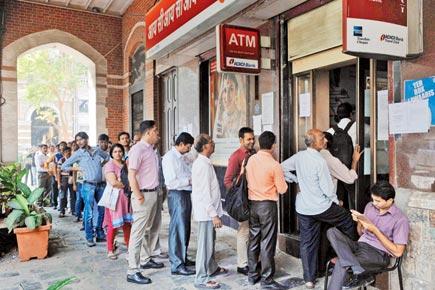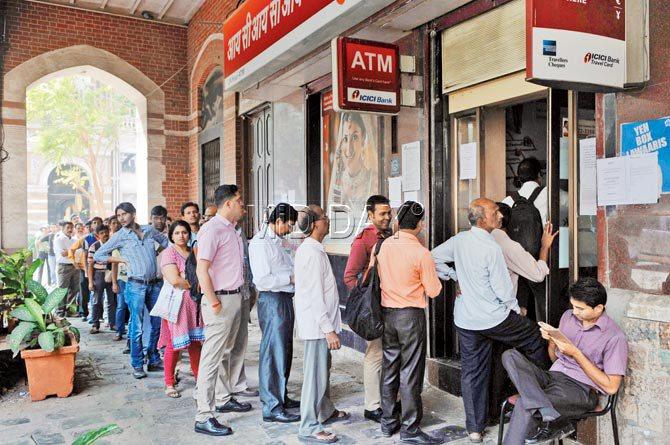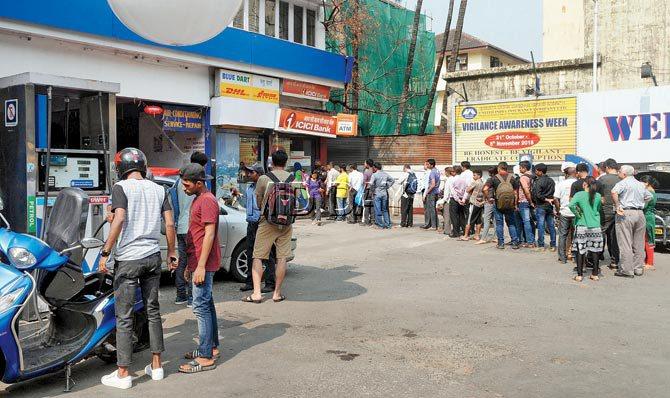Real estate observers say this is what Prime Minister Narendra Modi meant in his Goa speech on Sunday when he said more anti-black money measures are on their way


People queue up outside an ATM at Fort on Monday. Pics/Datta Kumbhar
ADVERTISEMENT
Here’s a warning to corrupt crooks living in ivory towers built on black money — the Modi government is coming after you. A day after PM Narendra Modi delivered a fiery speech indicating he was not done cleaning out corruption, real estate experts predict that his next move could end up shaking the very foundation of black money — benami property dealings.

People queue up outside an ATM in Colaba to withdraw new currency notes. While the demonetisation move has already made stashed black money worthless, the KYC move could have an even bigger impact on corruption
Here’s a warning to corrupt crooks living in ivory towers built on black money – the Modi government is coming after you. A day after PM Narendra Modi delivered a fiery speech indicating that he was not done cleaning out corruption, real estate experts predict that his next move could end up shaking the very foundation of black money – benami property dealings.
Also Read: Have you received these 12 hilarious forwards on demonetisation?
Thousands of crores of black money is thought to be parked in benami property deals. The rich and corrupt have been known to park their excess funds in real estate by using a frontman in order to evade questions about the size or source of their wealth.
Property experts believe that the Modi government will target this menace by imposing a mandatory Know Your Customer (KYC) registration for all such deals. The move will make it compulsory for all property owners (commercial, residential and even plots of land) to identify themselves before the government. Those who are found to possess benami properties and refrain from identifying themselves will face time in prison and the properties will also be wrested from them.
And why do the builders and real estate professionals think this is the next step? For one, PM Modi strongly hinted in his Sunday speech at Goa that he was going to go after benami property. “This is not the end. I have more projects in mind to make India corruption-free,” the PM had said, adding, “We will take action against benami property. This is a major step to eradicate corruption and black money.”
The Modi government’s intent seems clear, especially after the amendment to the Benami Transactions (Prohibition) Act, which has already come into force from November 1, and is now called the Prohibition of Benami Property Transactions Act, 1988.
Armed and ready
The maximum punishment has been increased to seven years of imprisonment along with a fine. More importantly, the law will not apply to all current and future transactions but will also retrospectively cover all past dealings.
This move will be a major weapon in the hands of the Department of Revenue, Central Board of Direct Taxes (CBDT) and the Ministry of Finance. A senior CBDT official said, “The PBPT Act defines benami transactions, prohibits them and further provides that violation of the PBPT Act is punishable with imprisonment and fine. The PBPT Act prohibits recovery of the property held benami from benamidar by the real owner. Properties held benami are liable for confiscation by the Government without payment of compensation.”
Expert speak
Sanjay Chaturvedi, a real estate expert and advocate, told mid-day, “Property owners will have to identify themselves before the local self government, similar to the process of KYC registration for bank accounts. Those properties that do not have KYC will be treated as benami property and can be seized.”
Read Story: Cash crunch! How Mumbaikars struggled outside ATMs on a bank holiday
He added, “It is a known fact that a lot of ill-gotten wealth is invested in real estate through third parties and introduction of KYC will help to expose such benami properties running into crores of rupees. The KYC norm will be applicable for all properties, including those in construction or redevelopment, IT parks and even open plots.”
The central government is already working towards a central KYC registry, a centralised and all banking transactions and property dealings will be directly linked with it, explained Chaturvedi.
Chartered Accountant Vimal Punamiya explained further, “KYC registration of property will expose black money running into crores in the real estate market. It will be a tedious process for the government to prove that a property is benami, but it can happen if the dummy owner confesses and exposes the actual investor.”
Win-win
This move will not only expose corruption, but will also help to stabilise property prices that are bloated because crores of black money have been invested.
Ashutosh Limaye, national director (Research) at Jones Lang Lasalle (JLL), said, “The demonetisation of Rs 1,000 and Rs 500 has given investors a major jolt and few investors were already moving out of the market because of unsatisfactory returns on their money. The real estate market will soon be witnessing a price correction. The introduction of KYC will bring out the unaccounted wealth invested in the industry, which will bring transparency within in the segment. However, those investing legitimate money in real estate can still be in the game.”
 Subscribe today by clicking the link and stay updated with the latest news!" Click here!
Subscribe today by clicking the link and stay updated with the latest news!" Click here!






